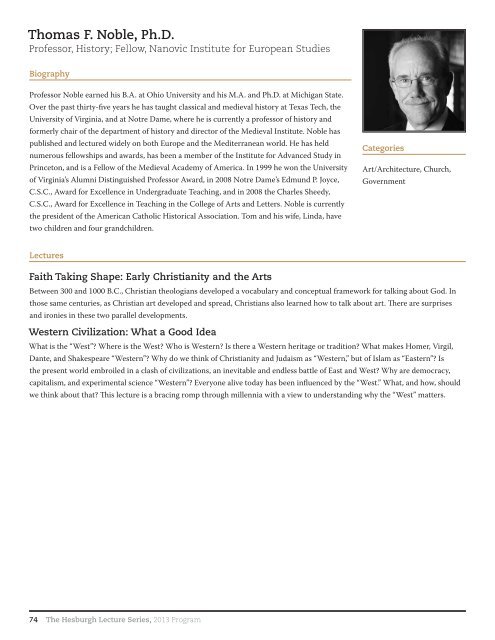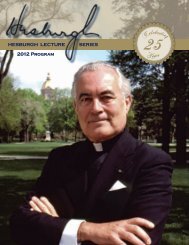HESBURGH LECTURE SERIES 2013 Program - Alumni Association ...
HESBURGH LECTURE SERIES 2013 Program - Alumni Association ...
HESBURGH LECTURE SERIES 2013 Program - Alumni Association ...
Create successful ePaper yourself
Turn your PDF publications into a flip-book with our unique Google optimized e-Paper software.
Thomas F. Noble, Ph.D.<br />
Professor, History; Fellow, Nanovic Institute for European Studies<br />
Biography<br />
Professor Noble earned his B.A. at Ohio University and his M.A. and Ph.D. at Michigan State.<br />
Over the past thirty-five years he has taught classical and medieval history at Texas Tech, the<br />
University of Virginia, and at Notre Dame, where he is currently a professor of history and<br />
formerly chair of the department of history and director of the Medieval Institute. Noble has<br />
published and lectured widely on both Europe and the Mediterranean world. He has held<br />
numerous fellowships and awards, has been a member of the Institute for Advanced Study in<br />
Princeton, and is a Fellow of the Medieval Academy of America. In 1999 he won the University<br />
of Virginia’s <strong>Alumni</strong> Distinguished Professor Award, in 2008 Notre Dame’s Edmund P. Joyce,<br />
C.S.C., Award for Excellence in Undergraduate Teaching, and in 2008 the Charles Sheedy,<br />
C.S.C., Award for Excellence in Teaching in the College of Arts and Letters. Noble is currently<br />
the president of the American Catholic Historical <strong>Association</strong>. Tom and his wife, Linda, have<br />
two children and four grandchildren.<br />
Lectures<br />
Faith Taking Shape: Early Christianity and the Arts<br />
Between 300 and 1000 B.C., Christian theologians developed a vocabulary and conceptual framework for talking about God. In<br />
those same centuries, as Christian art developed and spread, Christians also learned how to talk about art. There are surprises<br />
and ironies in these two parallel developments.<br />
Western Civilization: What a Good Idea<br />
What is the “West”? Where is the West? Who is Western? Is there a Western heritage or tradition? What makes Homer, Virgil,<br />
Dante, and Shakespeare “Western”? Why do we think of Christianity and Judaism as “Western,” but of Islam as “Eastern”? Is<br />
the present world embroiled in a clash of civilizations, an inevitable and endless battle of East and West? Why are democracy,<br />
capitalism, and experimental science “Western”? Everyone alive today has been influenced by the “West.” What, and how, should<br />
we think about that? This lecture is a bracing romp through millennia with a view to understanding why the “West” matters.<br />
74 The Hesburgh Lecture Series, <strong>2013</strong> <strong>Program</strong><br />
Categories<br />
Art/Architecture, Church,<br />
Government



